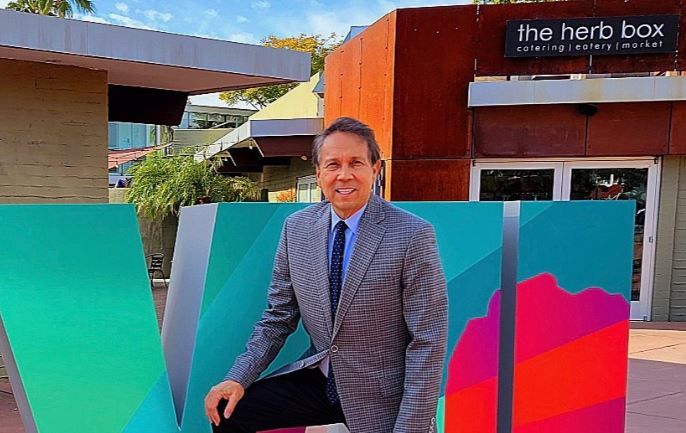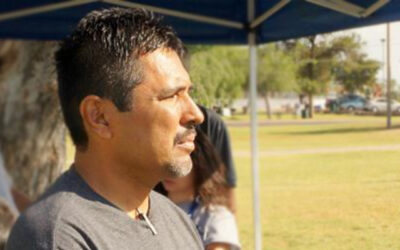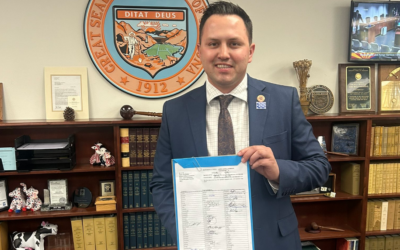By Corinne Murdock |
Scottsdale Mayor David Ortega has refused to allow Rio Verde citizens to use canal space to transport their water, effectively forcing them to go without, pay thousands in water bills, or leave their homes.
The Scottsdale canal route would be the short-term solution to save Rio Verde residents time and money until a proposed long-term solution, a stump pipe, can be worked out. In the meantime, Rio Verde residents must be frugal with what water they can obtain. Some have come to rely upon rainwater — a nonviable solution come summer. The trucks that reliably delivered affordable water for years are now expensive: per their 2021 drought plan, Scottsdale prohibited water haulers from taking water from its tanks, forcing truckers to trek through the Valley in search of water. Rio Verde residents face water bills of around $1,000.
During a House Natural Resources, Energy, & Water Committee meeting last week, Rio Verde’s representative, State Rep. Alex Kolodin (R-LD03), questioned Arizona Department of Water Resources (ADWR) Director Tom Buschatzke about Rio Verde residents’ predicament. Kolodin shared that EPCOR, a utility company, had offered to route water to the residents via a stump pipe, but in the meantime must transport it by truck.
Buschatzke said that, to his understanding, Scottsdale cut Rio Verdes’ water access off for preservation efforts. He said ADWR was willing to help as much as they could in obtaining groundwater for those residents via a stump pipe.
“[The city of Scottsdale] thought because of what’s happening on the river with those supplies, they needed to take that action to protect their customers and their own city,” said Buschatzke. “[Rio Verde residents] don’t have groundwater of their own to access, and that’s a big part of the problem.”
Kolodin asked why water purchased and transported from the Harquahala Valley wasn’t a viable idea. Buschatzke responded that EPCOR wasn’t eligible to use that water since they’re a private company, and because that water was considered a “non-groundwater source” under the law.
Kolodin told AZ Free News that EPCOR has had to undertake the costly endeavor of transporting the water by truck because the city of Scottsdale refused to allow access to their canal. Kolodin remarked that he doesn’t understand Ortega’s resistance to helping these communities, which he said was well within Ortega’s ability.
“I get why the city of Scottsdale doesn’t want to give them their water. I don’t understand why the city won’t let them transport other water through their canal until EPCOR can build the stump pipe,” said Kolodin. “I get it. You’re the mayor of Scottsdale, you want to circle the wagons. Why not let them move their water through your canal? That’s pure twisting their arm.”
Kolodin also questioned why Ortega wouldn’t opt to rent canal space for two years. He claimed that Ortega wasn’t happy that Rio Verde residents haven’t set up a water regulation structure yet continue to develop land, chalking it up to a “liberal agenda” of Ortega’s. Ortega was a longtime Democrat before becoming an independent.
“To me, that’s a sign of Mayor Ortega’s liberal agenda. He cares so much about forcing these people into groundwater regulation that he’s willing to hurt thousands of people just to teach them a lesson,” said Kolodin. “He wants to impose his liberal agenda on water regulation on them. He doesn’t like that they don’t live with a governmental structure. In his mind everyone should be regulated.”
Scottsdale has pushed its own citizens to reduce water usage due to the worsening drought over the past few years. The Bureau of Reclamation reclassified the Colorado River’s drought status worsened from Tier 1 last January to Tier 2a. While this would normally mean the city remains in Stage One of its Drought Management Plan issued 2021, the city warned residents that it was anticipating cuts from the federal government. In this first stage, the city issues recommendations and potentially restrictions, as well as shutting down or restricting commercial and residential fill stations.
Time is running out for these Rio Verde residents. In the meantime, Kolodin has busied himself arranging meetings between Rio Verde residents, EPCOR, Scottsdale City Council, the Arizona Corporation Commission, and even Freeport-McMoran for potential solutions.
Few others who speak publicly on the issue seem to empathize with the Rio Verde citizens’ plight. The Arizona State University (ASU) director of the Kyl Center for Water Policy, Sarah Porter, indicated to The New York Times that the homeowners bore some burden for their struggles since they bought an unincorporated area.
“It’s a cautionary tale for home buyers,” said Porter. “We can’t just protect every single person who buys a parcel and builds a home. There isn’t enough money or water.”
Corinne Murdock is a reporter for AZ Free News. Follow her latest on Twitter, or email tips to corinne@azfreenews.com.








